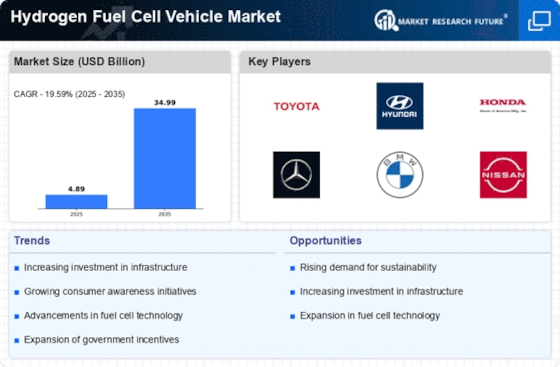Top Industry Leaders in the Hydrogen Fuel Cell Vehicle Market
 *Disclaimer: List of key companies in no particular order
*Disclaimer: List of key companies in no particular order
The Dynamic Landscape of the Hydrogen Fuel Cell Vehicle Market Players, Strategies, and Future Trends
The global hydrogen fuel cell vehicle market is on the brink of substantial growth, driven by escalating concerns about environmental pollution, increasing government support for clean energy technologies, and advancements in hydrogen fuel cell technology. This surge in demand has intensified competition within the market, with both established players and new entrants fervently seeking to secure their market share.
Key Players and Strategies:
- The Hyundai Motor Company (South Korea)
- Daimler AG (Mercedes-Benz) (Germany)
- BMW (Germany)
- General Motors Company (U.S.)
- Groupe Renault (France)
- Mazda Motor Corporation (Japan)
- Hydrogenics (Canada)
- Kia Motor Corporation (South Korea)
- Tata Motors Limited (India) among others
Toyota, a pioneer in hydrogen fuel cell vehicles, has been expanding its offerings and fostering partnerships within the industry. The company's significant investments in research and development have positioned it at the forefront of hydrogen fuel cell technology.
Hyundai, another major player, has focused on diversifying its fuel cell vehicle range and expanding its global presence. Actively engaged in developing hydrogen refueling infrastructure, Hyundai is committed to shaping the future of clean transportation.
Honda, with a focus on fuel cell technology for both passenger and commercial vehicles, has actively partnered with other companies to develop hydrogen refueling infrastructure and promote the adoption of hydrogen fuel cell vehicles.
Daimler has concentrated on developing fuel cell technology for commercial vehicles, particularly trucks and buses. Through strategic partnerships, the company has been actively involved in promoting the adoption of hydrogen fuel cell vehicles in the commercial sector.
Nikola, a US-based company, is investing heavily in hydrogen fuel cell technology, aiming to launch its first hydrogen fuel cell truck in 2023.
Hyzon Motors, another US-based company, has been manufacturing hydrogen fuel cell trucks and buses, expanding its operations globally with plans to enter additional markets soon.
Loop Energy, a Canadian company, specializes in developing hydrogen fuel cell technology for buses and has collaborated with various bus manufacturers to provide fuel cell systems.
Ballard Power Systems, also based in Canada, is a major supplier of fuel cell systems to the automotive industry, developing technology for transportation, stationary, and marine applications.
Factors for Market Share Analysis:
Several factors contribute to the competitive landscape of the hydrogen fuel cell vehicle market:
Brand Recognition: Established players like Toyota and Hyundai benefit from strong brand recognition in the automotive industry, providing a competitive advantage.
Product Portfolio: Companies with a diverse range of fuel cell vehicles are better positioned to meet the needs of a wider customer base.
Technology Leadership: Companies at the forefront of hydrogen fuel cell technology have a competitive edge in the market.
Distribution Network: A robust distribution network is crucial for reaching customers and expanding market share.
Government Support: Companies receiving government support in the form of subsidies or grants are better positioned for success.
Hydrogen Refueling Infrastructure: The availability of hydrogen refueling infrastructure plays a pivotal role in the adoption of hydrogen fuel cell vehicles.
Key Success Factors:
Cost Reduction: Lowering the cost of hydrogen fuel cell vehicles is crucial for consumer affordability and market growth.
Technological Innovation: Continuous innovation in hydrogen fuel cell technology is essential to enhance performance and reduce costs.
Government Support: Sustained government backing is vital for the long-term success of the market.
Hydrogen Infrastructure Development: A comprehensive hydrogen refueling infrastructure is essential for widespread adoption.
Market Developments and Latest Updates:
Hyundai Motor Company (South Korea): Launched the Nexo SUV in Europe on October 26, 2023, with increased range and improved performance.
Daimler AG (Mercedes-Benz) (Germany): Delivered its 100th GenH2.2 fuel cell truck to customers in Germany on December 5, 2023.
BMW (Germany): Reiterated its commitment to hydrogen fuel cells on October 24, 2023, without announcing new FCV models or projects recently.
General Motors Company (U.S.): Announced plans on November 17, 2023, to invest $2.2 billion in its Orion, Michigan, plant to produce Chevrolet Silverado pickup trucks with hydrogen fuel cell options starting in 2025.










